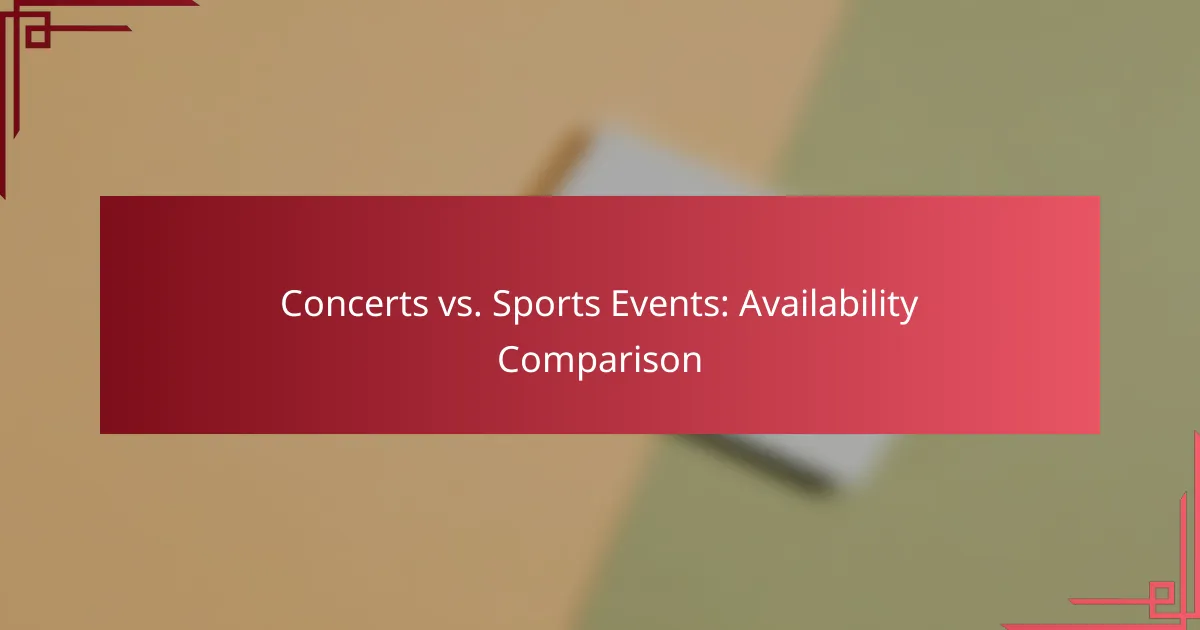When comparing availability for concerts and sports events, concerts tend to offer more options, especially in major cities, due to a greater number of dates and venues. This increased availability allows fans to find tickets more easily, while factors such as venue capacity and event timing also play a crucial role in ticket accessibility for both types of events.

Which events have better availability in major cities?
Concerts generally have better availability in major cities compared to sports events. This is due to the larger number of concert dates and venues, making it easier for fans to find tickets.
Concerts typically have more frequent dates
Concerts are often scheduled more frequently than sports events, especially in urban areas. Major cities can host multiple concerts each week, featuring a variety of artists and genres.
This increased frequency allows fans more opportunities to attend shows, as they can choose from different dates and venues. For example, a popular artist might perform in a city several times over a few weeks, while a sports team usually has a fixed number of home games each season.
Sports events often sell out quickly
Sports events tend to sell out faster than concerts, particularly for high-demand games like playoffs or championship matches. Fans often purchase tickets as soon as they become available, leading to limited availability.
In cities with popular teams, it’s common for tickets to be sold out within hours or even minutes. This urgency can make it challenging for casual fans to secure tickets, while concert-goers may have more flexibility in choosing when to buy.
Seasonal variations affect availability
The availability of both concerts and sports events can vary by season. Sports seasons are typically fixed, with specific months dedicated to each sport, which can lead to peaks in ticket demand during those times.
Conversely, concert availability can fluctuate throughout the year, with summer often being a peak season for outdoor festivals and tours. Fans should consider these seasonal trends when planning to attend events, as availability may be better during off-peak times.
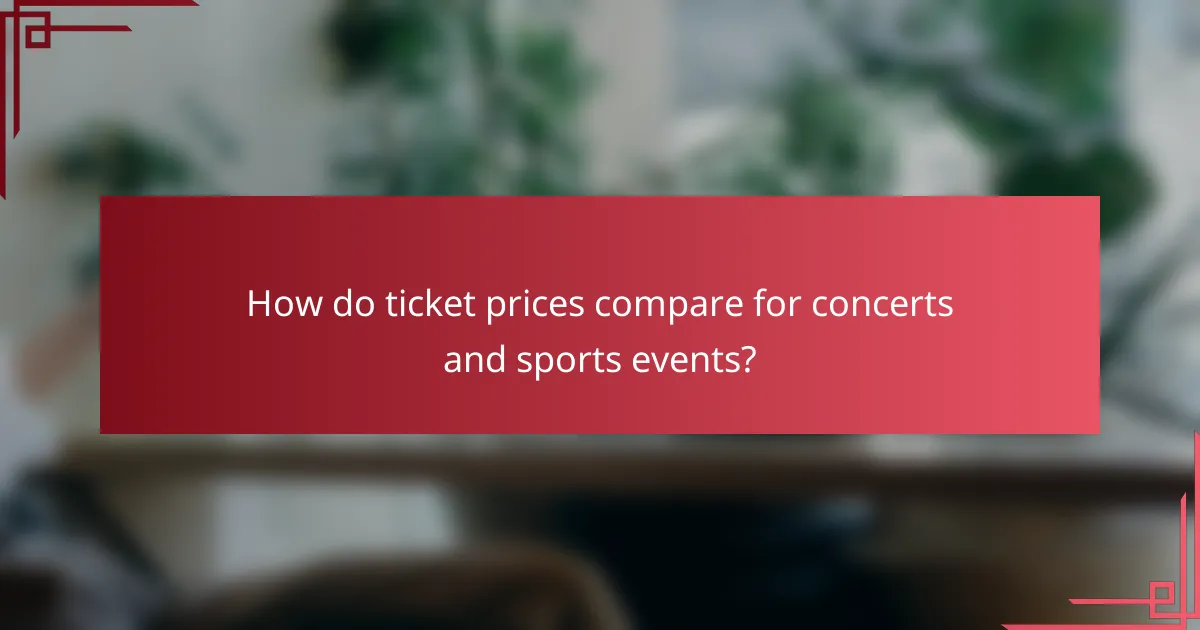
How do ticket prices compare for concerts and sports events?
Ticket prices for concerts and sports events can vary significantly based on various factors. Generally, concert tickets may range from affordable to premium prices depending on the artist, while sports event prices often fluctuate based on team popularity and the significance of the match.
Concert tickets often vary by artist
Concert ticket prices are heavily influenced by the artist’s fame and the venue size. For instance, tickets for major artists can start in the low hundreds of USD, while smaller acts may offer tickets for as little as $20 to $50. Premium seating or VIP packages can push prices even higher.
Additionally, factors such as the location of the concert and the timing can affect prices. Weekend shows or concerts in major cities typically command higher prices compared to weekday events or those in smaller towns.
Sports event prices depend on team popularity
Sports event ticket prices are largely determined by the popularity of the teams involved and the importance of the game. For example, tickets for high-stakes games, such as playoffs or rivalry matches, can reach hundreds or even thousands of USD, while regular season games may be more affordable, often ranging from $30 to $150.
Moreover, the location of the event plays a crucial role. Major league teams in large markets usually have higher ticket prices compared to minor league teams or those in smaller cities. Fans should also consider additional costs like parking and concessions when budgeting for a sports event.
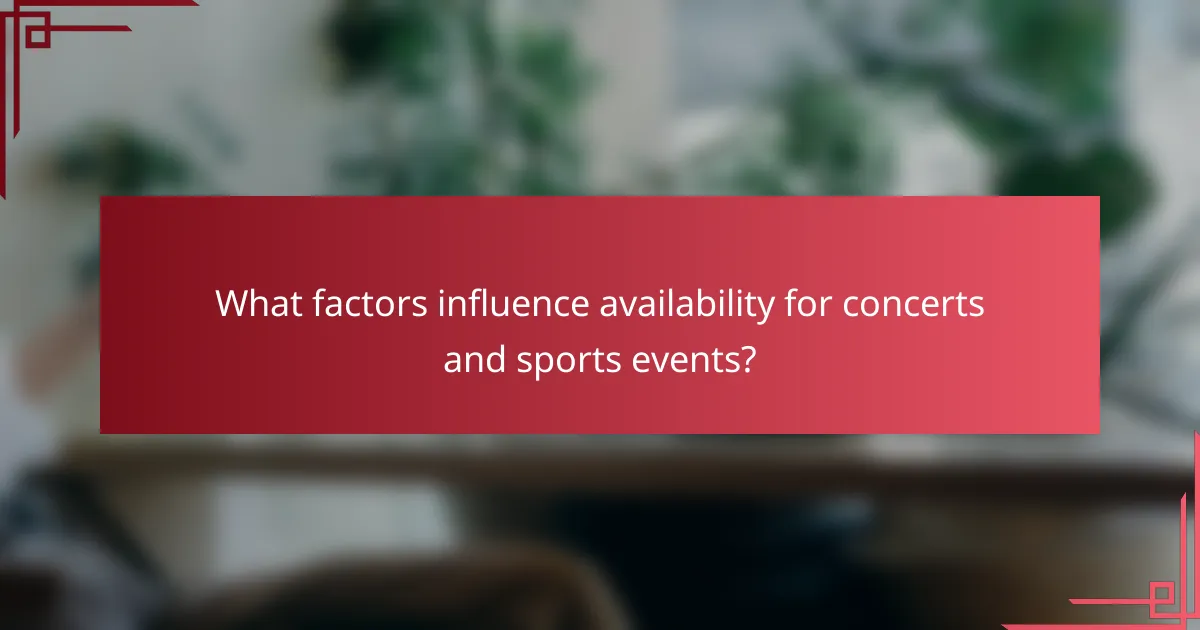
What factors influence availability for concerts and sports events?
Availability for concerts and sports events is influenced by various factors, including venue capacity, event timing, and ticket demand. Understanding these elements can help attendees better navigate their options and secure tickets.
Venue capacity impacts ticket availability
Venue capacity plays a crucial role in determining how many tickets are available for both concerts and sports events. Larger venues can accommodate thousands of attendees, which generally increases the number of tickets sold. However, this can also lead to higher competition for popular events.
For instance, a concert in a stadium with a capacity of 50,000 may sell out quickly, while a smaller venue with a capacity of 1,000 might offer a more intimate experience but fewer tickets overall. It’s essential to consider the venue size when planning to attend an event, as this directly affects availability.
Event timing affects audience turnout
The timing of an event significantly influences audience turnout and, consequently, ticket availability. Events scheduled during weekends or holidays typically attract larger crowds, resulting in quicker sellouts. Conversely, events held on weekdays or during off-peak seasons may have more tickets available.
For example, a major concert on a Saturday night will likely see higher demand compared to a Tuesday afternoon game. When planning to attend, consider the day and time of the event to gauge potential availability and increase your chances of securing tickets.

How do local regulations affect event availability?
Local regulations play a crucial role in determining the availability of concerts and sports events. These regulations can dictate when and where events can be held, impacting scheduling and attendance.
Noise ordinances impact concert scheduling
Noise ordinances are laws that limit sound levels during specific hours, affecting when concerts can take place. For example, many cities restrict loud music after 10 PM, which can force organizers to schedule events earlier in the evening.
Concert promoters must consider these regulations when planning events. Failure to comply can result in fines or even event cancellations, so it’s essential to check local noise laws before booking venues.
Stadium regulations influence sports events
Stadium regulations often include safety codes, capacity limits, and event-specific rules that can impact the scheduling of sports events. For instance, certain venues may require extensive safety checks before allowing large crowds, which can delay event start times.
Additionally, local authorities may impose restrictions on the types of events held at specific stadiums. Understanding these regulations is vital for teams and organizers to ensure compliance and avoid disruptions.
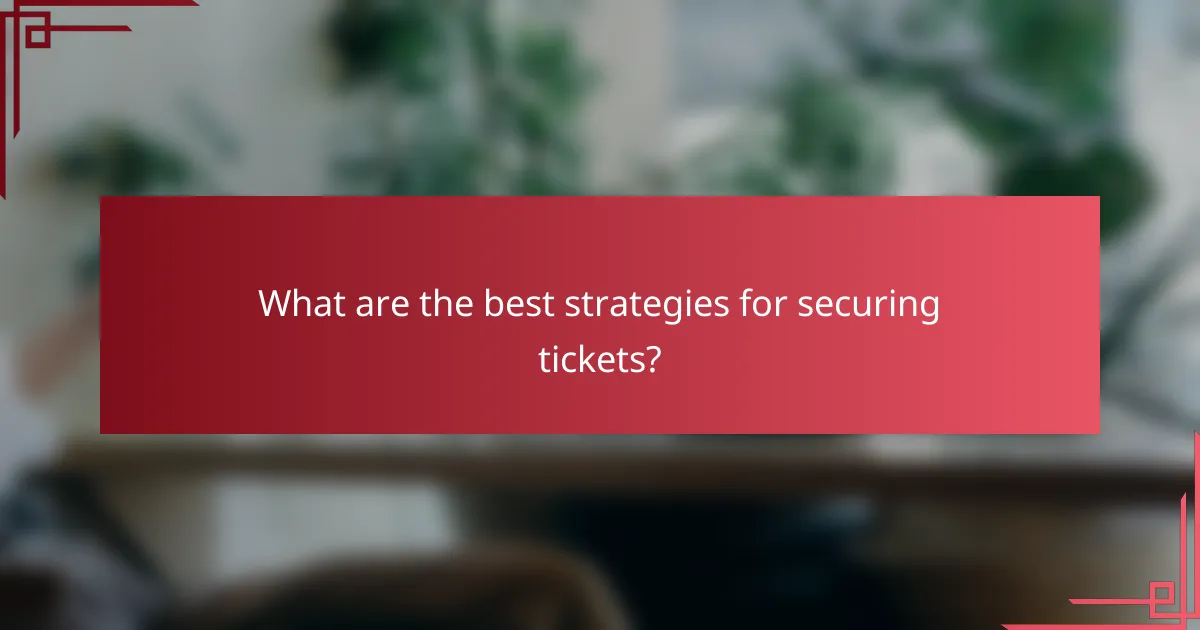
What are the best strategies for securing tickets?
To secure tickets effectively, consider using presale codes and joining fan clubs. These strategies can significantly increase your chances of obtaining tickets for popular concerts and sports events.
Use presale codes for concerts
Presale codes are unique identifiers that allow fans to purchase tickets before the general public. These codes are often distributed through artist newsletters, social media, or ticketing platforms. By using a presale code, you can access a limited number of tickets, which can be crucial for high-demand concerts.
To maximize your chances, sign up for artist newsletters and follow them on social media to receive presale announcements. Be ready to act quickly, as these tickets can sell out within minutes. Keep an eye on the specific time and date when the presale begins, and have your payment information ready for a faster checkout.
Join fan clubs for sports teams
Joining a sports team’s fan club can provide exclusive access to tickets, often before they are available to the general public. Fan clubs typically offer members-only presales, discounts, and priority seating options. This can be particularly beneficial for popular teams where demand often exceeds supply.
When considering a fan club, check for membership fees and the benefits they offer. Some clubs may provide additional perks like meet-and-greets or merchandise discounts. Always stay informed about upcoming presales and events by regularly checking the fan club’s website or communications.
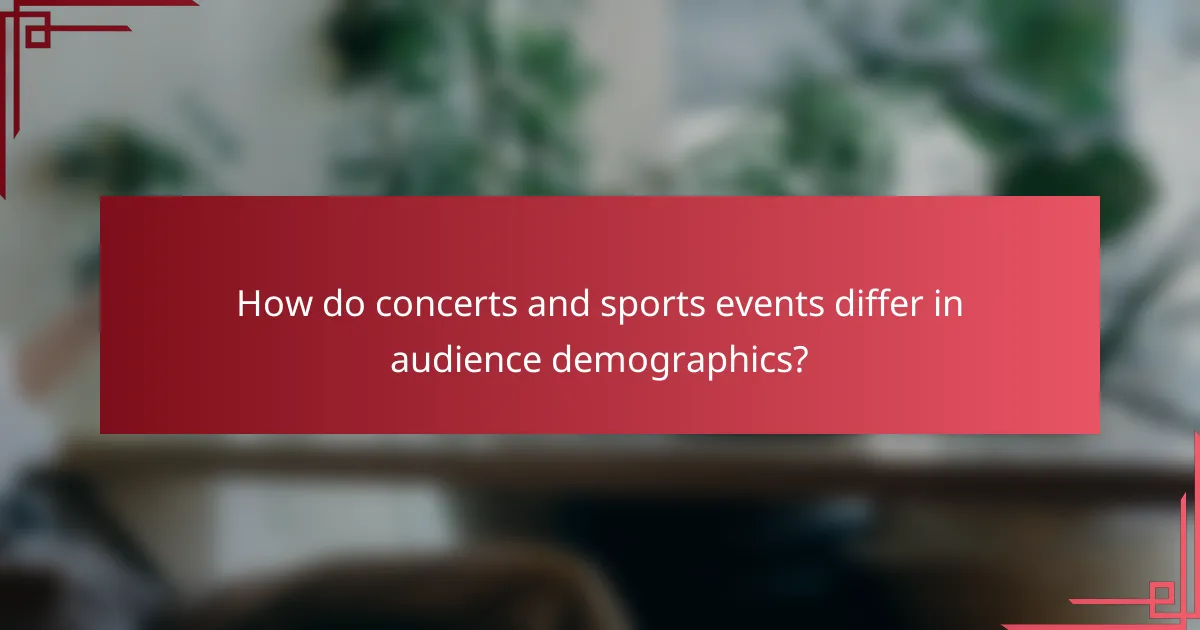
How do concerts and sports events differ in audience demographics?
Concerts and sports events attract distinct audience demographics, influenced by factors such as age, interests, and social settings. Generally, concerts tend to draw a younger crowd, while sports events are more popular among families and older fans.
Concerts attract a younger audience
Concerts are often frequented by individuals in their late teens to early thirties, reflecting a vibrant, energetic atmosphere. This demographic is typically drawn to the latest music trends and the social experience that concerts provide.
Many concerts feature popular artists and genres that resonate with younger audiences, such as pop, hip-hop, and electronic music. Festivals, which combine multiple artists and genres, are particularly appealing, often attracting thousands of attendees in a single event.
Sports events appeal to families and older fans
Sports events usually attract a more diverse age range, with a significant portion of attendees being families and older fans. These events often serve as family outings, providing entertainment that appeals to both children and adults.
In addition to the excitement of the games, sports events often include activities for kids, such as fan zones and interactive exhibits. This family-friendly environment makes sports events a popular choice for weekend outings, fostering a sense of community among fans of all ages.
